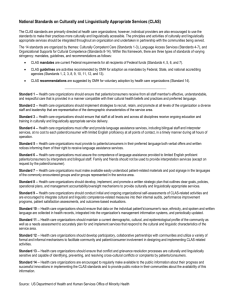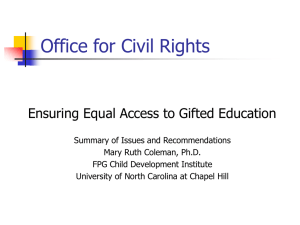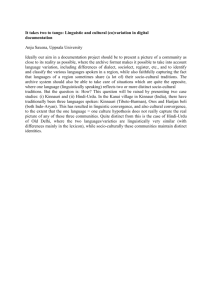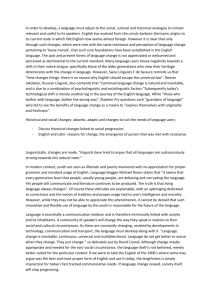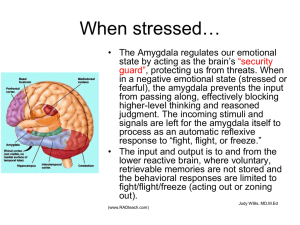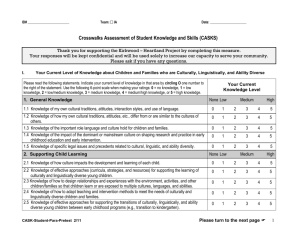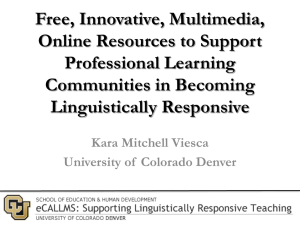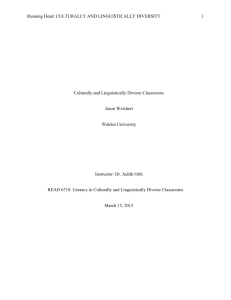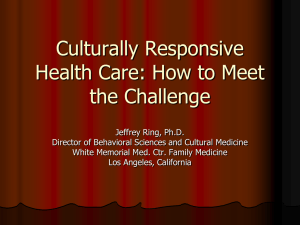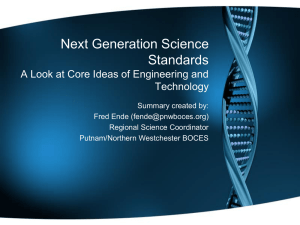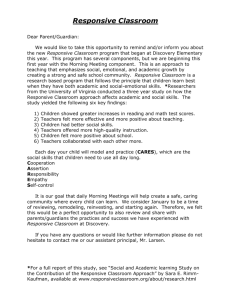files/ckimages/files/eCALLMS Opportunities in Science Handout
advertisement
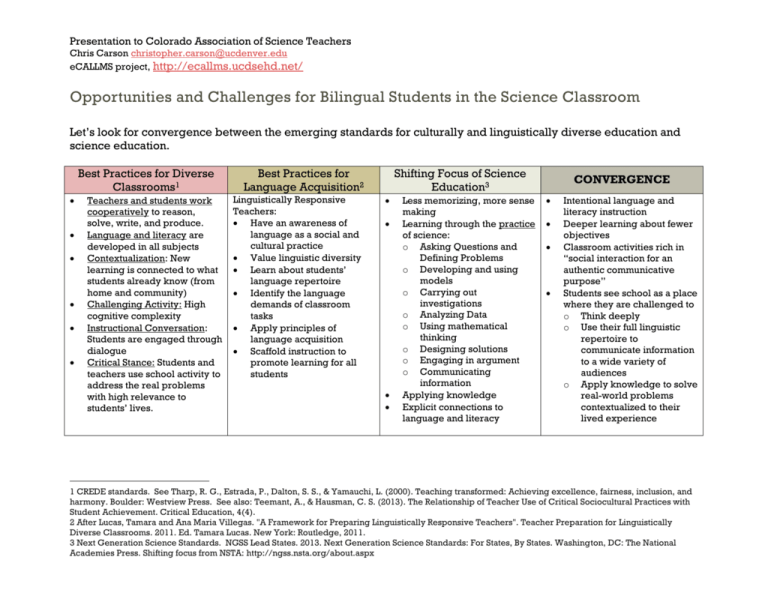
Presentation to Colorado Association of Science Teachers Chris Carson christopher.carson@ucdenver.edu eCALLMS project, http://ecallms.ucdsehd.net/ Opportunities and Challenges for Bilingual Students in the Science Classroom Let’s look for convergence between the emerging standards for culturally and linguistically diverse education and science education. Best Practices for Diverse Classrooms1 Teachers and students work cooperatively to reason, solve, write, and produce. Language and literacy are developed in all subjects Contextualization: New learning is connected to what students already know (from home and community) Challenging Activity: High cognitive complexity Instructional Conversation: Students are engaged through dialogue Critical Stance: Students and teachers use school activity to address the real problems with high relevance to students’ lives. Best Practices for Language Acquisition2 Linguistically Responsive Teachers: Have an awareness of language as a social and cultural practice Value linguistic diversity Learn about students’ language repertoire Identify the language demands of classroom tasks Apply principles of language acquisition Scaffold instruction to promote learning for all students Shifting Focus of Science Education3 Less memorizing, more sense making Learning through the practice of science: o Asking Questions and Defining Problems o Developing and using models o Carrying out investigations o Analyzing Data o Using mathematical thinking o Designing solutions o Engaging in argument o Communicating information Applying knowledge Explicit connections to language and literacy CONVERGENCE Intentional language and literacy instruction Deeper learning about fewer objectives Classroom activities rich in “social interaction for an authentic communicative purpose” Students see school as a place where they are challenged to o Think deeply o Use their full linguistic repertoire to communicate information to a wide variety of audiences o Apply knowledge to solve real-world problems contextualized to their lived experience 1 CREDE standards. See Tharp, R. G., Estrada, P., Dalton, S. S., & Yamauchi, L. (2000). Teaching transformed: Achieving excellence, fairness, inclusion, and harmony. Boulder: Westview Press. See also: Teemant, A., & Hausman, C. S. (2013). The Relationship of Teacher Use of Critical Sociocultural Practices with Student Achievement. Critical Education, 4(4). 2 After Lucas, Tamara and Ana Maria Villegas. "A Framework for Preparing Linguistically Responsive Teachers". Teacher Preparation for Linguistically Diverse Classrooms. 2011. Ed. Tamara Lucas. New York: Routledge, 2011. 3 Next Generation Science Standards. NGSS Lead States. 2013. Next Generation Science Standards: For States, By States. Washington, DC: The National Academies Press. Shifting focus from NSTA: http://ngss.nsta.org/about.aspx Presentation to Colorado Association of Science Teachers Chris Carson christopher.carson@ucdenver.edu eCALLMS project, http://ecallms.ucdsehd.net/ Culturally Responsive Teaching Linguistically responsive teaching Shifting focus for science education Opportunities for bilingual learners Opportunities: The changing guidelines for science instruction (NGSS + Framework) more closely align with the type of classroom activity shown to be effective for culturally and linguistically diverse learners: Rich opportunities for academic language to be used in social interactions Contextualized learning with high cognitive challenge Specific language and literacy instruction Opportunities to apply learning in community context Challenges: In order to realize the potential for meaningful communication during science learning, we need professional development that helps shift thinking about science instruction. Scientific ideas and concepts can and should be taught through science and engineering practices that engage bilinguals in meaningful communication with an authentic purpose. Professional development for science teachers must also develop the dispositions and skills necessary for great content-based language instruction. eCALLMS professional development modules attempt to meet these challenges. These free, online resources help teams of teachers look for alignment between the science standards and linguistically responsive education. They provide flexible learning opportunities to refine the dispositions and the skills necessary to support bilingual excellence. These modules are free resources for professional learning communities. To find out more, visit: http://ecallms.ucdsehd.net/about/ Or email us: ecallms@ucdenver.edu
